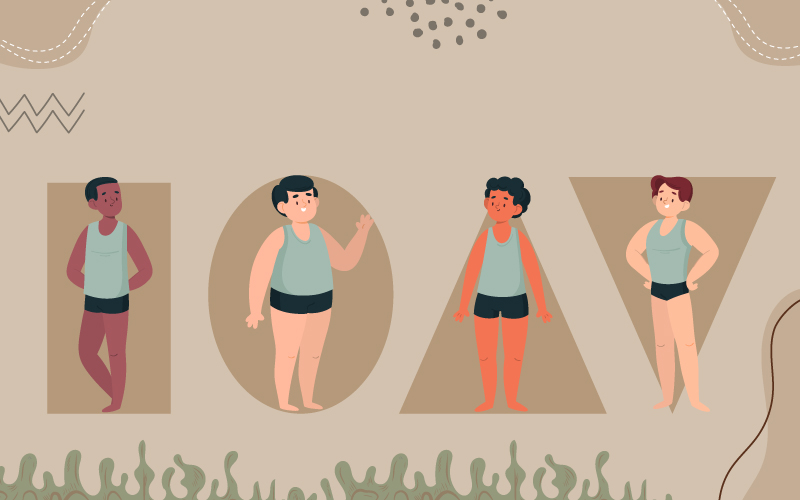Body image and self-esteem are crucial aspects of mental health that profoundly affect individuals’ lives. While much attention has been given to these issues in women, it is equally important to acknowledge that men also struggle with body image and self-esteem concerns. As a life coach, I have witnessed firsthand the impact these issues can have on men’s mental and emotional well-being.
Understanding Body Image in Men
Body image refers to how individuals perceive their physical appearance and how they feel about their bodies. In men, body image concerns often center around muscularity, body fat, and overall physical fitness.
Societal standards and media portrayals of the ideal male body—typically muscular, lean, and athletic—can significantly influence men’s perceptions of their bodies. These unrealistic ideals can lead to dissatisfaction and negative self-perception, contributing to low self-esteem.
The Pressure to Conform
Men are often subjected to societal pressures to conform to specific body standards. From a young age, boys are exposed to images of superheroes, athletes, and action figures that exemplify strength and muscularity.
These images create an expectation that to be attractive and successful, a man must possess a certain body type. This pressure is further exacerbated by media, advertising, and social media, where images of fit and muscular men are ubiquitous.
The Impact on Self-Esteem
Self-esteem refers to an individual’s overall sense of self-worth or personal value. When men perceive their bodies as falling short of societal standards, it can lead to negative self-esteem.
They may feel inadequate, unattractive, or even ashamed of their bodies. This negative self-perception can affect various aspects of their lives, including relationships, work performance, and overall mental health.
Common Body Image Issues in Men
Muscle Dysmorphia
Muscle dysmorphia, often referred to as “bigorexia,” is a condition where men become obsessed with the idea that they are not muscular enough. Despite having well-developed muscles, individuals with muscle dysmorphia perceive themselves as being too small or weak. This condition can lead to excessive exercising, unhealthy eating habits, and the use of performance-enhancing substances.
Weight and Body Fat
Concerns about weight and body fat are not limited to women. Many men also struggle with issues related to their weight and body composition. The desire to achieve a lean, toned physique can lead to unhealthy dieting practices, over-exercising, and disordered eating behaviors.
Height and Hair Loss
Height and hair loss are additional body image concerns that can affect men’s self-esteem. Shorter men may feel less confident or perceive themselves as less attractive due to societal preferences for taller stature. Similarly, hair loss can be a significant source of distress for men, impacting their self-image and confidence.
The Role of a Life Coach in Addressing Body Image and Self-Esteem Issues
As a life coach, my role is to support men in developing a positive self-image and building healthy self-esteem.
Encouraging Self-Acceptance
Self-acceptance is the foundation of a positive body image. Encouraging men to accept their bodies as they are, without comparing themselves to unrealistic ideals, is crucial. This involves recognizing and challenging negative self-talk and reframing thoughts in a more positive light. For example, instead of focusing on perceived flaws, men can be guided to appreciate their bodies for what they can do and the unique qualities they possess.
Promoting Healthy Habits
While it’s important to promote self-acceptance, it’s equally vital to encourage healthy habits that contribute to overall well-being. This includes a balanced diet, regular physical activity, and sufficient rest. The goal is to focus on health and vitality rather than striving for a specific body type. Men should be encouraged to engage in activities they enjoy and that make them feel good, rather than punishing themselves with excessive workouts or restrictive diets.
Building Self-Esteem Through Achievements
Self-esteem can be bolstered by setting and achieving personal goals. Life coaching can help men identify their strengths, set realistic and meaningful goals, and celebrate their achievements. Whether it’s advancing in their careers, learning a new skill, or developing a hobby, these accomplishments can enhance their sense of self-worth and confidence.
Challenging Societal Norms
Part of addressing body image issues involves challenging the societal norms and stereotypes that perpetuate unrealistic standards. Men should be encouraged to question and critically evaluate the messages they receive from media and society. This can be done through discussions, education, and exposure to diverse representations of male bodies.
Fostering Positive Relationships
Healthy relationships can significantly impact self-esteem. Encouraging men to build and maintain supportive relationships with friends, family, and partners can provide a strong foundation for positive self-image. Surrounding oneself with people who offer encouragement, acceptance, and constructive feedback can make a profound difference.
Mindfulness and Self-Compassion
Practicing mindfulness and self-compassion can help men develop a more compassionate and non-judgmental relationship with their bodies. Mindfulness involves being present and fully experiencing the moment without judgment. Self-compassion entails treating oneself with the same kindness and understanding that one would offer to a friend. These practices can reduce negative self-talk and promote a more positive body image.
Final Thoughts
Body image and self-esteem are significant issues for men, impacting their mental and emotional well-being. As a life coach, it is my mission to help men navigate these challenges and develop a positive self-image.
By promoting self-acceptance, encouraging healthy habits, challenging societal norms, and fostering positive relationships, men can build the self-esteem they need to lead fulfilling and confident lives. Remember, every journey is unique, and with the right support and mindset, positive change is possible.

Leave a Reply
You must be logged in to post a comment.